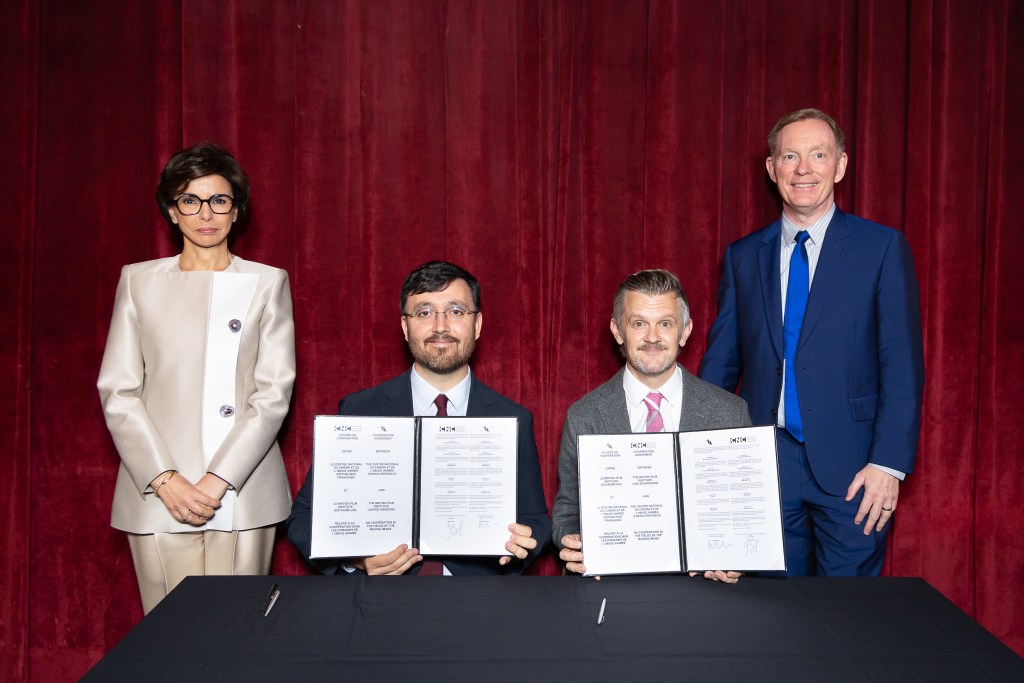The British Film Institute (BFI) and France’s National Cinema Centre (CNC) have signed a Moving Image Co-operation Agreement aimed at fostering closer collaboration between the UK and French film industries.
The agreement comes during French President Macron symbolic trip to London in a first state visit for any European leader to the UK since the Brexit.
In spite of close cultural and business ties between the two countries, cooperation their between their film industries has not always been straightforward due to different financing systems and legislation.
Brexit, which saw the UK quit the European Union and Creative Europe as a result, has also made collaboration harder.
Today’s accord was signed by BFI Chief Executive Ben Roberts and CNC’s President Gaëtan Bruel in the presence of French Culture Minister Rachida Dati and UK Minister for Creative Industries, Arts and Tourism Chris Bryant.
It remains to see to what the extent the Memorandum of Understanding (MoU) will bear fruit but in principle it will enable the BFI and the CNC, both founding members of EFAD (European Film Agency Directors Association), to establish a policy of strategic co-operation to enhance cultural diversity, widen audiences and strengthen their respective industries.
Joint areas of activity will include public policy to support film, audiovisual and moving image sector; education, with a focus on providing moving image culture to young audiences; heritage, including restoration, preservation and collaboration on specific projects, and events to facilitate greater business and professional relationships between UK and French companies with a focus on, but not limited to, co-production.
The deal also aims to encourage mutual knowledge sharing between BFI and CNC through an employee exchange programme and audience development and support measures for cinemas, festivals and national online platforms with a focus on encouraging UK audiences for French films and vice versa.
“France and the United Kingdom are two great film nations, with strong institutions that have a global vision of cinema and a desire to support independent creativity,” said French Culture Minister Dati. “Today, this issue is directly linked to cultural sovereignty. I am convinced that we can work with the United Kingdom to develop fruitful exchanges in support of independent creativity.”
Ben Roberts, BFI Chief Executive echoed Dati’s words, describing the UK and France as ”two of Europe’s most dynamic filmmaking nations.”
“We have a long history of collaboration, including through co-production and the distribution and exhibition of each other’s films across all platforms,” he said. “Co-production is one of the most meaningful ways we can continue this shared exchange – and this initiative of knowledge building and collaboration has been built in that spirit. In the UK we have created the conditions to foster this through the UK Global Screen Fund and carefully designed Audio-Visual Expenditure Credits including the new Independent Film Tax Credit of 40%,” he added.
The MoU follows in the wake of partnership agreements already in place between the British Film Commission and Spain, Italy, Austria, Norway, Malta and the Netherlands.
Recent film and HETV productions that filmed or did their VFX work in both the UK and France include: The Amateur, Prime Target, Heads of State, Damsel, The Lord of the Rings, Rings of Power Season 2.
Adrian Wootton OBE, Chief Executive of the British Film Commission, who was also at the signing ceremony, welcomed the accord.
“We are delighted to be strengthening our relationship with Film France and the CNC with today’s partnership agreement, building on a long standing relationship with our friends across the Channel,” he said.
“Within a similar time zone and geographical neighbours, there’s an ease for productions working within this European production hub,” he added. “Our aim with this MoU is to work more closely with the CNC to support a frictionless service for cross-territory productions, allowing both nations to harness the economic and creative potential of inward investment film and high-end TV production.”
The CNC’s Bruel echoed these words: “Our two countries offer an exceptional combination of assets: a rich diversity of natural locations—each with its own distinctive identity—skilled professionals, robust infrastructure, and world-leading VFX and post-production ecosystems. By deepening our collaboration, we are creating new opportunities for producers and building a more connected, competitive environment for cross-border production. This is both a cultural and economic opportunity, and we are proud to move forward with our British partners”.
